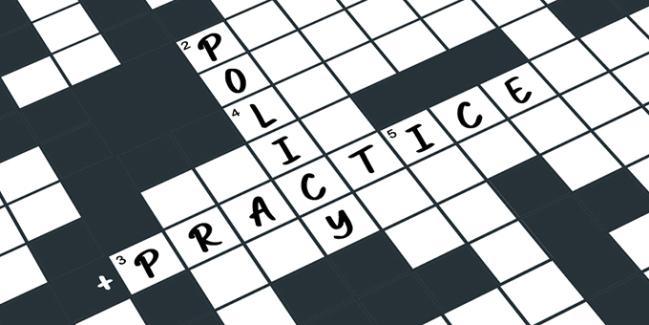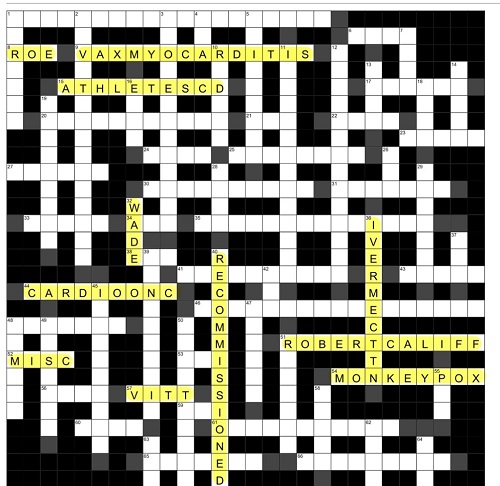Top Policy and Practice News for Cardiologists in 2022
Big influences were the COVID-19 pandemic, Roe v. Wade’s repeal, reimbursement cuts, and stressed healthcare systems.

This year, the COVID-19 pandemic continued to loom large in cardiology, but a number of other developments in policy and practice also made waves in 2022.
Deeply partisan political decisions in the United States had an impact on cardiologists there. Back in February, cardiologist and clinical trialist Robert Califf (51 Across) was installed—for the second time—as Commissioner of the US Food and Drug Administration (recommissioned, 40 Down), a move that many hope will help bolster cardiovascular disease research, prevention, and care in the US. The overturn of Roe (8 Across) v. Wade (32 Down), in June, with its profound impact on abortion access, has roiled the field of cardio-obstetrics by limiting the options for women with cardiovascular conditions that make pregnancies risky, if not lethal.
Across the Atlantic, the European Society of Cardiology (ESC) issued its first-ever guidelines for cardio-oncology (cardioonc, 44 Across). A multidisciplinary effort by the ESC, the European Hematology Association, the European Society for Therapeutic Radiotherapy and Oncology, and the International CardioOncology Society, the document offers clinicians advice on CV health and wellness before, during, and after the treatment of cancer. The relatively new subspecialty addresses the needs of not only current cancer patients but also survivors.
COVID-19, unsurprisingly, continued to dominate conversations worldwide.
Early in 2022 came some good news. Research on COVID-19-related multisystem inflammatory syndrome in children (MISC, 52 Across) showed that when cardiac issues do develop they tend to resolve relatively quickly. Rumors that COVID-19 vaccines were causing sudden deaths in professional sports figures (athleteSCD, 15 Across) were resoundingly debunked by cardiologists, as reported in a TCTMD feature article.

Yet other studies have explored the risks associated with getting a COVID shot. The Oxford/AstraZeneca vaccine, for instance, has been conclusively linked to a higher risk of thromboembolic events, such as vaccine-induced immune thrombotic thrombocytopenia, or VITT (57 Across), leading several European countries to suspend its use. And while there does appear to be a slight increase in the risk of myocarditis in patients who receive an mRNA-based COVID-19 shot (vaxmyocarditis, 9 Across)—most notably male adolescents and young adults—study after study has confirmed that myocarditis is much more common and severe when following infection with SARS-CoV-2.
Monkeypox (54 Across), the other viral disease that made headlines this year, also has been linked to myocarditis. Cases, however, have been rare.
Beyond cardiology, but a regular theme in 2022, was the unfounded enthusiasm with which some people embraced misinformation and quack cures. Multiple studies have debunked the idea that ivermectin (36 Down), the antiparasitic drug often used in cats and dogs, is able to prevent COVID-19 progression among high-risk patients (although it remains an effective dewormer). Separately, another recent study showed no benefit to a range of natural supplements for lowering cholesterol in people prescribed a statin.
What Else?
Did we miss anything important with regards to health policy and practice as it pertains to cardiology in our Crossword Challenge? TCTMD reached out to American College of Cardiology President Edward T. A. Fry, MD (Ascension St. Vincent Hospital in Indianapolis, IN), to get his top picks for pivotal news in 2022 that fell out of the realm of cardiovascular medicine.
Top of mind, he said, is “the really rather dire economic environment that health systems find themselves in right now,” most notably workforce challenges in nursing, “the base of the pyramid that's holding everything together.” Labor costs and lack of staffing have had a cascade effect, said Fry, where patients are less able to get the care they need and health systems are less able get enough sustainable revenue for them to “keep their lights on and doors open.”
Fry has seen this firsthand, he told TCTMD: “The primary hospital that I work at has five open-heart surgery suites, of which at one point we were down to two, simply because that's all we could staff.”
Also important this year, he added, are the cuts to Centers for Medicare & Medicaid Services reimbursement for 2023, which are “shining a light on a system that is completely broken and completely dysfunctional” and has failed thus far to move toward value-based care.
The potential bright side is that both of these issues may finally spur change, said Fry.
Additionally, while the overturn of Roe v. Wade has had a negative impact on health, within the field of cardiology it’s brought one positive development—greater recognition of cardio-obstetrics’ role.
“Maternal mortality is very much driven by cardiovascular mortality and the thing that we have probably the greatest ability to impact is our cardiovascular risk factors,” he observed. “We may even, by doing so, have benefits that extend generations, because now we know that these adverse outcomes and problems that occur during pregnancy are in and of themselves a separate set of cardiovascular risk factors, which will play themselves out over the next 10, 20, 30 years.”
And finally, Fry said, the COVID-19 pandemic has brought attention to the fact that social determinants of health are critically important. But the question, he added, is whether knowledge of inequities will lead to action: “We’ve identified the problem. Now what do we do about it?”
Caitlin E. Cox is Executive Editor of TCTMD and Associate Director, Editorial Content at the Cardiovascular Research Foundation. She produces the…
Read Full Bio




Comments